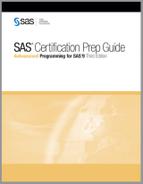About This Book
Audience
The SAS Certification Prep Guide: Advanced Programming for SAS®9 is for new or experienced SAS programmers who want to prepare for the SAS Advanced Programming for SAS®9 exam.
Requirements and Details
Purpose
The SAS Certification Prep Guide: Advanced Programming for SAS®9 helps prepare you to take the SAS Advanced Programming for SAS®9 exam. New and experienced SAS users who want to prepare for this exam will find this guide to be an invaluable, convenient, and comprehensive resource that covers all of the topics tested on the exam.
Major topics include SQL processing with SAS, the SAS macro language, advanced SAS programming techniques, and optimizing SAS programs. You will also become familiar with the enhancements and new functionality that are available in SAS®9.
The book includes quizzes that enable you to test your understanding of material in each chapter. Additionally, solutions to all quizzes are included at the back of the book.
Note: Exam objectives are subject to change. Please view the current exam objectives at support.sas.com/certify.
Prerequisites
Candidates must earn the SAS Certified Base Programmer credential for SAS®9 before taking the SAS Advanced Programming for SAS®9 exam. The SAS Certification Prep Guide: Base Programming for SAS®9 covers all of the objectives tested on the SAS Base Programming for SAS®9 exam, including importing and exporting raw data files, creating and modifying SAS data sets, and identifying and correcting data syntax and programming logic errors.
If you want to test yourself to see if you have the necessary prerequisite Base programming knowledge, go to http://support.sas.com/basepractice.
How to Create Practice Data
To set up practice data in SAS, select Help ![]() Learning SAS Programming from the main SAS menu. When the SAS Online Training Sample Data window appears, click OK to create sample data.
Learning SAS Programming from the main SAS menu. When the SAS Online Training Sample Data window appears, click OK to create sample data.
If you are using SAS Learning Edition 4.1, you can practice what you learn in this book by using the SAS windowing environment (the programming approach to SAS) to create the data under the Help menu.
On your desktop, right-click My Computer and select Explore from the pop-up menu.
Navigate to the directory where you installed SAS Learning Edition.
Right-click sas.exe and select Send To and then select Desktop.
A SAS icon now appears on your desktop.
Anytime you want to start the SAS windowing environment, double-click the SAS icon on your desktop.
The SAS Learning Edition 4.1 will not be available after December 31,2011. Please refer to SAS e-learning for information on the Learning edition and SAS OnDemand for Academics. More information is available at support.sas.com/publishing.
SAS Certification Practice Exam: Advanced Programming for SAS®9
The SAS Certification Practice Exam: Advanced Programming for SAS®9 was designed to help you prepare for the SAS Advanced Programming for SAS®9 exam. This practice exam was constructed to test the same knowledge and skills as the official certification exam. You can access this exam under the SAS Certification category at https://support.sas.com/edu/schedules.html?id=449. There is a fee for this practice exam.
Additional Resources
Other resources might be helpful when you are learning SAS programming. You can refer to them as needed to enhance your understanding of the material covered in this book. You can access SAS help, documentation, and other resources from your SAS software or on the Web.
From SAS Software |
|
Help |
For SAS®9, select Help SAS Enterprise Guide, select Help |
Documentation |
For SAS®9, select Help For SAS Enterprise Guide: access online documentation on the Web. See On the Web on page xiii. |
On the Web |
|
Bookstore |
http://support.sas.com/publishing/ |
Training |
http://support.sas.com/training/ |
Documentation |
http://support.sas.com/documentation/ |
Certification |
http://support.sas.com/certify/ |
SAS Learning Edition |
http://support.sas.com//learn/le/ |
SAS Global Academic Program |
http://support.sas.com/learn/ap |
SAS OnDemand |
http://support.sas.com/ondemand/ |
|
|
Knowledge Base |
http://support.sas.com/resources/ |
Support |
http://support.sas.com/techsup/ |
Learning Center |
http://support.sas.com/learn/ |
Community |
http://support.sas.com/community/ |
Syntax Conventions
This is an example of how the general form of SAS code is shown in the book:
General form, basic PROC SQL step to perform a query:
PROC SQL;
SELECT column-1<,...column-n>
FROM table-1|view-1<,...table-n|view-n>
<WHERE expression>
<GROUP BY column-1<,... column-n>>
ORDER BY column-1<,... column-n>>;
where
PROC SQL
invokes the SQL procedure
SELECT
specifies the column(s) to be selected
FROM
specifies the table(s) to be queried
WHERE
subsets the data based on a condition
GROUP BY
classifies the data into groups based on the specified column(s)
ORDER BY
sorts the rows that the query returns by the value(s) of the specified column(s).
For example, in the general form above,
SELECT, FROM, WHERE, GROUP BY, and ORDER BY
are in uppercase because they must be spelled as shown.
column-1, table-1, view-1, and expression
are in italics because each represents a value that you supply.
<,...column-n>
is enclosed in angle brackets because it is optional syntax.
table-1 and view-1
are separated by a vertical bar (|) to indicate that they are mutually exclusive.
The general forms of SAS statements and commands that are shown in this book include only the syntax that you need to know to prepare for the certification exam. For complete syntax, see the appropriate SAS reference guide.
For information about how to register for the official SAS Advanced Programming for SAS®9 exam, see the SAS Global Certification Web site at http://support.sas.com/certify.
